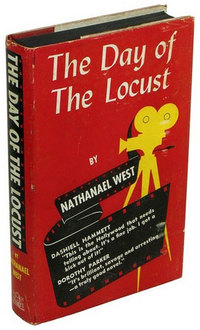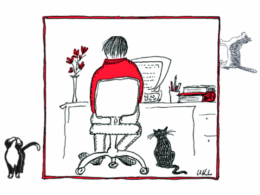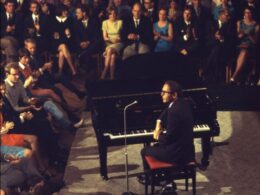
In his brief life Nathanael West wrote four darkly comic novels, two of them acclaimed masterpieces: Miss Lonelyhearts, a devastating portrait of a newspaper columnist overwhelmed by his readers’ sufferings, and The Day of the Locusts, an apocalyptic vision of the underside of the Hollywood dream. In a prescient article for The Boston Phoenix in 1997 Virginia Heffernan wrote “[West] seems to have become a writer, like Frank Norris or Djuna Barnes, whose work is periodically ‘revived,’ appreciated, and explained, and then returned to the hands of more stalwart fans.” Based on recent evidence, a sustained revival of Nathanael West seems to be at hand.
For one, West today has his own Twitter account. Marion Meade, author of Lonelyhearts: The Screwball World of Nathanael West and Eileen McKenney, a dual biography of West and his wife, hosts both the Twitter account (in West’s voice) and http://www.nathanaelwest.com/, a site devoted in equal parts to West, McKenney, and the book, and featuring a good deal of trivia and media about the couple.
Joe Woodward’s blog, The Nathanael West Project, chronicles on an almost daily basis his writing of a biography of West. Last week he posted a lengthy rumination for 3:AM Magazine, which included a description of the fateful last dinner party at West’s home in North Hollywood on Friday, December 13, 1940. That night West and McKenney hosted F. Scott Fitzgerald and Sheila Graham, Dorothy Parker, the screenwriters Albert and Frances Hackett, and the artist Hilaire Hiler.
No one at the party that night could have known it, but it was the last time any of them would see F. Scott Fitzgerald or Nathanael West alive. Fitzgerald would never finish The Last Tycoon and never see the whole of his Pat Hobby short story cycle published. And West, he would never get beyond the start of that fifth novel. The following weekend they would both be gone. Scott would die at the age of 44, the following Saturday, of a heart attack while reading the Princeton alumni magazine, and West, at 37, and his new wife Eileen, at 27, would die in a horrific car accident in the middle of the California desert.
A 1932 editorial in Americana, the short-lived magazine West co-edited with the Dadaist George Grosz, proclaimed. “We are the laughing morticians of the present.” This may help explain why West’s Wikipedia entry is one of the few with a link to Findagrave, a website where visitors can locate the graves of more than 4,000 writers and commemorate them with virtual flowers and comments.
On a livelier note, many clips are surfacing online of West’s screenwriting efforts, giving glimpses of his mordant style. Fans of Lost may enjoy the trailer for one of West’s last screenplays, Five Came Back (1939). Lucille Ball’s badinage in this clip from the same movie has a Westian flair. And Peter Lorre seems the perfect vehicle for West’s offhanded menace in Stranger on the Third Floor.



